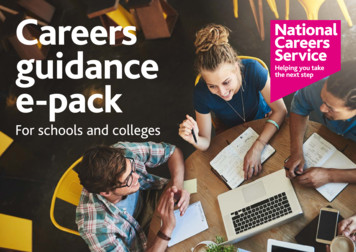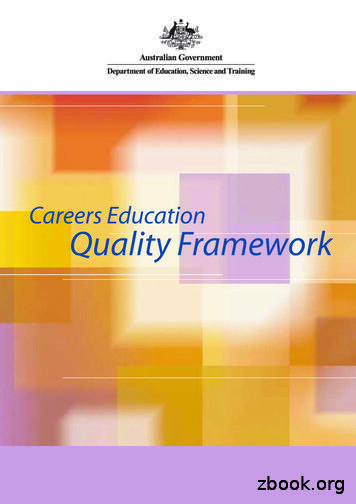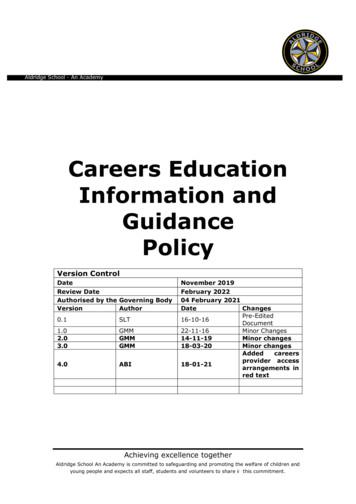CAREERS EDUCATION AND GUIDANCE
The Sixth Form CollegeNorth HillColchesterCO1 1SNt: 01206 500700f: 01206 500770www.colchsfc.ac.ukPolicy DocumentsCareers Education,Information, Adviceand Guidance2019
THE SIXTH FORM COLLEGE, COLCHESTERCAREERS EDUCATION, INFORMATION, ADVICE ANDGUIDANCE POLICY1.POLICY STATEMENT1.1The College will provide a planned provision of activities, courses and programmes thatare inclusive and support all students’ personal career development in line with therequirements of the Gatsby Benchmarks, the College Mission Statement, StudentCharter and other College policies relating to student guidance and support.1.2The College will provide Careers Education, Information, Advice and Guidance(CEIAG) that is student-centred and impartial.1.3All CEIAG will be directed to the specific needs of the student and will be based on theprinciples of: development of self-awareness and decision making skills opportunity awareness and career exploration career management progression and transition into the world of work or Higher/ FurtherEducation1.4The College will support all key elements of a student’s entitlement to CEIAG: Maintain a planned, co-ordinated programme of careers education which ensuresindividual progression Provide all students with access to individual guidance Support action planning as part of the review and reporting process Provide students with access to accurate and comprehensive careers information Support students looking for opportunities to access direct experience of the worldof work and work related learning1.5Careers Education will be part of the centrally co-ordinated curriculum framework1.6CEIAG will be integrated within all relevant student experiences: pre-entry andapplications, on course and pastoral systems, future planning and post-exit.1.7Self-Assessment of CEIAG is based on Ofsted and Gatsby guidelines1.8The policy is reviewed regularly with contributions from those involved in CEIAG.2.AIMS2.1To co-ordinate careers activities, to meet the Gatsby Benchmarks, and link them tostudent development.2.2To have clearly defined aims and learning objectives for all careers education.2.3To have a programme of staff development.2.4To have clearly defined roles and responsibilities for staff involved in CEIAG.2.5To use the services of external fully qualified guidance practitioners to ensureimpartiality.2.6To provide adequate resources for the provision of CEIAG.2.7To arrange contributions from parents, governors, employers, training providers, HEIsand others, as appropriate.1
2.8To undertake regular review and evaluation.3OBJECTIVESThe objectives of CEIAG provision in College are student centred and designed to meetthe requirements of the Gatsby benchmarks:3.1To deliver a Stable Careers Programme.3.1.1To maintain a planned, co-ordinated programme of careers education which ensuresindividual student progression.3.1.2To support action planning as part of the review and reporting process.3.1.3To highlight career learning within curriculum areas.3.1.4To provide students with access to accurate and comprehensive careers information.3.1.5To support students looking for opportunities to access direct experience of the worldof work.3.1.6To publish the Careers Programme on the College website.3.1.7To review regularly the programme with feedback from learners, parents, college staffand employers.3.2To provide access to good quality information about future study options andlabour market opportunities.3.2.1To provide Parents and Students information at the Employability and HigherEducation Briefing.3.2.2To provide students with access to information about career paths and the local andnational labour market.3.3To meet the career learning needs of each student.3.3.1To promote awareness of the opportunities and options that are open and to know thedifferent routes that can be followed and to assess and evaluate alternatives.3.3.2To encourage broad thinking – looking at possible career or higher education coursesfrom a variety of viewpoints and the different rewards and demands.3.3.3To keep systematic records of the individual advice given to each learner, andsubsequent agreed decisions.3.3.4To develop systems to facilitate student self-recording and evaluation of career learningexperiences.3.3.5To collect and maintain accurate data for each learner on their education, training oremployment destinations.3.3.6To help students be aware of the various avenues of help, advice and sources ofinformation that are available and to take the initiative in using them.3.3.7To help students to visualise themselves in new roles and to develop their career plansregardless of gender and racial stereotyping.3.3.8To help students understand application procedures and make effective applications.2
3.3.9To provide all students with accurate and up-to-date information, including computerprograms, relating to HE, FE, Training, Employment, Year Out Opportunities and WorkRelated Learning.3.3.10 To provide open and continuous access to students, staff, and parents during thecollege day and at all College events: Open Evenings, Parents’ Evenings, Induction,Enrolment, etc.3.3.11 To monitor information (E&D) and signpost it clearly.3.3.12 To advise students how to use the main sources of information appropriate to theirneeds.3.3.13 To respond to requests for information.3.4To ensure Careers Education, Information and Advice is embedded in the widerCollege curriculum framework, including the College Tutorial Programme.3.4.1To demonstrate the relevance of a student’s current studies to future planning andcareer aspirations.3.4.2To be aware of Employability Skills which can be developed within a student’scurriculum subjects and highlight opportunities to advance these skills.3.5To provide all students with the opportunity to engage with employers andemployees through curriculum areas and planned careers events.3.5.1To encourage all students to record their work related learning experiences includingtheir own part time work and volunteering activities and reflections on the employabilityskills they have developed.3.6To support students looking for opportunities to access direct experience of theworld of work.3.7To provide encounters with providers of, and learners in, Further and HigherEducation and Employers and Employees.3.7.1To provide all students with accurate and up-to-date information, including computerprograms, relating to HE, FE, Training, Apprenticeships, Employment, Year OutOpportunities and Work Related Learning.3.7.2To provide all students with the opportunity to engage with Further and HigherEducation providers through curriculum areas and planned careers events.3.7.3To provide students with opportunities to engage with potential education providersand/ or employers at Universities and Colleges and/or in the workplace.3.8To provide all students with access to personal guidance.3.8.1To encourage students to look at all the options open to them and to consider the widerand longer-term implications.3.8.2To help students clarify their thoughts, attitudes and expectations as well as theiranxieties and doubts.3.8.3To help students to broaden their horizons and reach their full potential while helpingthem to be ambitious but realistic about their plans and choices.3
3.8.4To share knowledge and provide relevant sources of information and contacts.3.8.5To discuss and agree a plan of action.3.8.6To support students in their decisions and applications.3.8.7To provide students with personal guidance including access to a QualifiedIndependent Careers Advisor.4.0CURRICULUM FRAMEWORKCareers Education, Information and Advice is embedded in the wider College curriculumframework but is most clearly evident in the Tutorial Programme. The framework is informed bystudent needs, legislation, national and local developments and incorporates: 5.0Specified learning outcomes – students may also identify their own learning objectives.Accreditation opportunities.Skill development.Work Related Learning.Opportunities for recording achievement, reviewing progress, self-development, careerexploration and career management.TEACHING AND LEARNING STRATEGIESCareers Education, Information and Advice is: Based on principles governing the delivery of high quality careers education/ informationand advice. Structured with clear aims, objectives and learning outcomes. Integrated into learning and assessment programmes. Accessible to all students and supportive of equal opportunities. Differentiated according to student needs. Delivered by appropriately experienced and qualified staff.Learning in Careers Education is: Assessed as appropriate, recorded, reported and evaluated. Informed by up-to-date information about developments in the economy and labourmarkets.Support for students All students have the opportunity to attend careers education / information and advicesessions. All students have access to careers resources, equipment and information includingCareers Guidance and Careers events. Student feedback and evaluation contributes to further developments.6.0 7.0RESOURCESThere is a designated budget for Careers Education, Information, Advice and Guidance.Careers Education is delivered and assessed by appropriately experienced and qualifiedstaff.There is an effective system for identifying and meeting the professional developmentneeds of all staff in relation to Careers Education.There are (comparatively) excellent facilities and resources for Careers Education.Effective use is made of external and appropriately qualified guidance practitioners(impartiality)Effective use is made of networks, organisations and individuals outside College.MANAGEMENTCareers Education/ Information and Advice in the College is supported by:4
8.0 A written policy as a working document.Partnership working in the College.Effective communication systems.A clear line management structure with a senior manager taking strategic responsibility forCareers Education/ Information and Advice.A named person responsible for co-ordinating Careers Education, Information and Adviceacross the College.Defined roles and responsibilities for College staff.Appropriate guidance, support and access to training for staff.Curriculum departments have a ‘Careers or Higher Education Representative’ who has aspecific role.QUALITYCareers Education in the College is reviewed regularly.Quality Assurance procedures incorporate Careers Education/ Information and Advice.The College holds the Recognition of Quality Award for CIAEG (Quality in CareersStandard) and Work Related Learning.Monitoring arrangements for Careers Education, Information and Advice include:- Student participation in Careers Information and Advice sessions.- Staff development.- The views of participants and contributors.- The relevance, value and appropriateness of the content and nature of Careers.Education, Information and Advice activities.The outcome of Quality Assurance arrangements are used:- To inform strategic development and operational plans.- To inform the content of the Tutorial Programme and Pastoral systems.- To maintain quality standards for Careers Education, Information and Advice.5
Delivery Programme1.STAFFINGAll staff are involved in CEIAG. The work of the department is directed by Anne Johnson –Assistant Principal also has a line management responsibility for Careers. Staff within theCollege have specific responsibilities within the Careers Department as follows:CAREERS TUTORSMike Cura, Evette Hawkins, AnneJohnson (General)INDEPENDENT CAREERS ADVISER/EXTERNAL PRACTITIONERBetty MartinCAREERS DEPARTMENTADMINSTRATIVE SUPPORTVicky Clare, Kelly Smith, Sheila PooleOXBRIDGEIan Macnaughton, Dan Stebbings, AdamBantickUCAS ADMINISTRATIVE SUPPORTHEAD OF DEPARTMENT/CAREERS LEADEREvette HawkinsLisa Steptoe, Chelsea McIntyreSPONSORSHIP & YEAR OUTHayley HallworthWORK RELATEDLEARNING/EMPLOYERENGAGEMENT/ APPRENTICESHIPSMike CuraTEACHING CAREERS/ HESheila PooleMEDICALLY RELATED CAREERS(Doctors, Dentists, Vets)Emma Cresswell-Maynard, Kate Thacker,Karen BurnsCURRICULUM DEPARTMENT HE/CAREERS REPRESENTATIVES6
2.CAREERS EDUCATIONAll students have the opportunity to participate in Careers Education, Information and Advicethat is related to their career aims and interests.2.1THE TUTORIAL PROGRAMME: Careers Education is an integral part of the Tutorialprogramme for all students, which is internally assessed and accredited.2.2WORK RELATED LEARNING: All students have the opportunity to undertake WorkRelated Learning through the College curriculum, Additional Studies programme or IBCAS programme.2.3APPLIED GENERAL COURSES: Students studying applied courses such asBusiness, Health and Social Care, Performance Studies, Law, Criminology, ICT andScience may, as part of their course, undertake learning/ a module which relatesdirectly to work related learning.2.4A Level, Applied General and IB COURSES: Careers Education, Information andAdvice is the main focus of the ‘2day programme’ – Compulsory for all Year 1 A Level/Applied General and IB students (held in May after Internal Spring Assessments andbefore A level teaching commences).3.CAREERS INFORMATION & ADVICE 4.The Careers library is open and staffed throughout the College day from 8.30 amto 4.30 pm during term time.An extensive range of up-to-date information is available on FE, HE, Employment,Training, Year Out, Careers, Voluntary Work, Part-time and Vacation Work via theCollege intranet - MOODLE.Careers software programs are available across the College computer network andall stations have Internet access. The Careers department has a number of usefulweb-links identified in the Careers Information section of the College VLE (Moodle)Careers bulletin – distributed on a monthly basis. Advertises job vacancies (parttime and full-time), FE, HE and general Careers information.Student Bulletin – on line daily for students. Advertises job vacancies (part-timeand full-time), FE, HE and general Careers information.Books and other resources in the Careers Library are available for loan, the systembeing linked into the main College Library.In April of each year a review of Careers library resources is undertaken andappropriate spending decisions are made.The department produces a range of In-house guides and documents for students.E.g. ‘Managing Your Career’ ‘Completing and checking your UCAS application’(Available on Moodle).CAREERS GUIDANCECareers interviews are available to all students. Appointments are made in theCareers Library where a working diary is kept. Interview times are available throughoutthe College working day. Also for the period after IB, A/ Applied General & GCSEresults are published (July/August Counselling). Interviews are undertaken byappropriately qualified and experienced College and an Independent, QualifiedCareers Advisor. Plans of action are discussed, agreed and recorded. Appropriatelyqualified and experienced staff are usually available throughout the College day forstudents to drop-in for information, advice or guidance.4.1Interview opportunities: Self-referral Referral by Personal or Senior Tutor Compulsory progression interviews for Advanced Foundation (AFP) students Follow-up interviews Referral by academic subject staff Pre-entry interview referrals7
4.2Careers Information, Advice and Guidance is available at College events: Induction Enrolment Open Evenings Parents’ Evenings Briefing for Parents Careers / HE Convention ‘2-day’ careers event5.CAREERS EVENTS AND ACTIVITESThese are an integral part of the Careers Education programme and support students’career decisions. They are supported by a wide range of Career, HE, FE, Year Outand Employment advisers/ specialists. College based events:- GCSE / Advanced Foundation – Progression Activity- Autumn Term- Introduction to Careers & Careers Convention,aimed at Year 1 IB & A Level students- Spring Term- Year 1 IB & A Level students Progression Activity 2 day programme- SummerTermThe Tutorial Programme - All students- Throughout the year External events:- ‘Essex HE Convention’ – Year 1 students & parents (optional) - Summer Term- Local and national Careers/ HE conventions- all students (optional)- Throughout the year- University Open Day Visits (optional)- Throughout the year6.NETWORKING AND LIAISON6.1Networking and liaison with Employers, Careers Enterprise Company, TrainingProviders, Higher Education Admissions Tutors, Advisers representing Career areasand Year Out activities is fundamental to Careers Information, Advice and Guidanceand to the Careers Education programme. The College has maintained effective linkswith Employers and the local Community. Close links are maintained with IAGParticipation Consultants in Essex as well as careers staff in local schools and colleges.The College hosts a Briefing Event for these staff, each September. 7.Regular meetings offer continuous networking opportunities:- Local IAG Support group meetings- FE IAG meetings- Make Happen (Essex NCOP)- Essex University Schools Membership Plus ProgrammeWORK RELATED LEARNINGAll students have the opportunity to undertake Work Related Learning, as part of theirCollege Curriculum, to support their Career Plan/ Career exploration activities.The College holds Essex Recognition of Quality Award for WRL.8.QUALITY: Monitoring, Review and EvaluationThis is undertaken in line with the College Self-Assessment procedure. Outcomes arerecorded in and contribute to the Cross College Self-Assessment Report as well asinforming the College’s Strategic Plan. Student and staff views and perceptions aregained from the following: Student Questionnaires8
Focus groupsEvaluation of Careers Events (formal and informal)Informal feedback and evaluation of Careers InterviewsTutorial reviewsTutorial Working PartySenior Tutor MeetingsSenior Management MeetingsThe College holds the Essex Recognition of Quality Award for CEIAG.9.STAFF DEVELOPMENTCEG/ IAG is recognised as a dynamic and constantly changing area and there is clearlya need for on-going updating of Careers information, application procedures, etc. TheCollege approach to staff development is therefore to concentrate on this aspect toensure staff and students are in receipt of accurate and up-to-date information, adviceand guidance.9.1Staff development programmes are arranged to meet the long and short-term needs ofboth the individual and the College and in response to local and national initiatives.9.2Individual staff development and training needs are identified through formalprocedures, such as the Continuing Professional Development (CPD) process, StaffDevelopment interviews, Tutorial Reviews, Department SARs.9.3Training needs are identified and discussed at the College Staff DevelopmentCommittee, Senior Tutor meetings, Divisional meetings, etc.9.4Systems are established for notifying staff of training opportunities.9.5Systems are established for the dissemination of the outcomes of training sessions.9.6An introduction to CEG is an integral part of the Induction Programme for new staff.SUPPORTING DOCUMENTS See SharePoint (Internal access for staff), College Public web site, MOODLE, StudentHandbook, Parent Handbook, College Prospectus, Tutorial Programme, Key dates.9
Careers Education is delivered and assessed by appropriately experienced and qualified staff. There is an effective system for identifying and meeting the professional development needs of all staff in relation to Careers Education. There are (comparatively) excellent facilities and resources for Careers Education. Effective use is made of external and appropriately qualified guidance .
Careers & Enterprise Company: Guide for new Careers Leaders in schools. Essential information, helpful resources and practical tools to help newly appointed Careers Leaders get started in the role. National Careers Service. The National Careers Service provides information, advice and guidance to help people make decisions on learning, training and work opportunities. The service .
Our e-pack of careers guidance resources will help you deliver impartial careers information, advice and guidance in line with your statutory guidance duties and help you work towards several of the Gatsby Benchmarks. This pack is designed to add value to your existing careers provision and give you time-saving tools and resources to help you effectively and efficiently plan careers lessons .
The concept of careers and career-related learning in the primary school phase typically provokes a cautious reaction. Terms such as 'careers learning', 'careers education' or 'careers lessons' are often conflated with careers guidance which is often understood to be focused on careers choice. Many parents and teachers have concerns
The Careers Education Quality Framework is a 'guide for those who guide'. It provides teachers, careers specialists, school leaders and school communities with a practical tool for self-assessing Careers Education and developing action plans for improvement. The Careers Education Quality Framework (the Framework) is not intended as a means
information or ask the careers advisor a careers related question or enquiry. The careers advisor will arrange to attend visits to employers, Further and higher Education institutions, training providers and related Careers Conferences and workshops to support LMI knowledge and keep up-to
careers that relate to the environmental goal defined on their worksheet. Students can search for related careers by keyword, subject area, or cluster. (If they need help identifying careers that fit their assigned goal, they can find the example careers in the program and look in the Related Careers section for inspiration.)
Impartial Careers Education: Statutory Guidance The Education and Skills Act 2008 requires local authority maintained secondary schools, in discharging their statutory duty to provide careers education, to provide impartial information and advice which promotes the best interests of pupils and which does not seek to promote the interests of the school over other options. It also requires .
API 6A Flanges Catalogue. API 6A - TYPE - 6B 13.8 MPA (2000 PSI) Size B OD C (MAX.) K P E T Q X BC N H LN HL JL Ring Number R or RX 2 1/16 53.2 165 3 108 82.55 7.9 33.4 25.4 84 127 8 20 81 60.3 53.3 23 2 9/16 65.9 190 3 127 101.60 7.9 36.6 28.6 100 149.2 8 23 88 73.0 63.5 26 3 1/8 81.8 210 3 146 123.83 7.9 39.7 31.8 117 168.3 8 23 91 88.9 78.7 31 4 1/16 108.7 275 3 175 149.23 7.9 46.1 .























